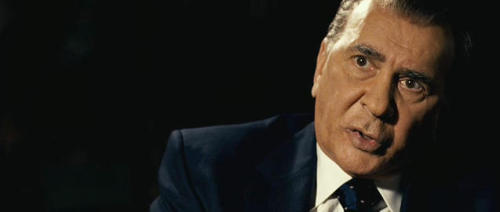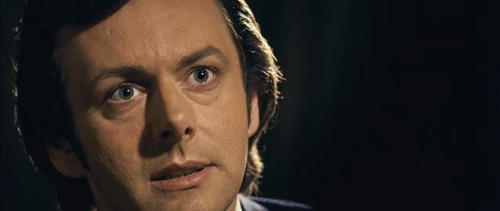Frost / Nixon (Ron Howard, 2008)
Ron Howard might well be the perfect studio director. There are lots of better filmmakers around, but Howard is a studio head’s dream: talented, reliable, professional. Even a supposedly quintessentially commercial filmmaker like Steven Spielberg will deliver films that are either much better (Jaws) or much worse (Indiana Jones and the Kingdom of the Crystal Skull) then they ought to be given the material; Howard, however, does exactly what he is asked just about every time. Give him a light and frothy Lowell Ganz and Babaloo Mandel script and he’ll give you Splash or Parenthood; an undistinguished action script and he’ll give you Backdraft; a popular but stupid potboiler and he’ll make The Da Vinci Code; a too-tricky-for-its-own-good Akiva Goldsman prestige drama and he’ll win you Best Picture with A Beautiful Mind; a solid space based docu-drama and it’s Apollo 13; and so on, and on. The point is, with those and other films, Howard brought out what was there. He didn’t pull rabbits out of his hat when scripts were lacking, either, but that’s no insult, because he made every one of those films impeccably: some just had more going for them than others. And so it is with Frost / Nixon. Handed an adaptation of a stage play built around two extremely impressive performances, he has delivered an immaculately made film that preserves those performances for posterity.
The performances are by Michael Sheen and Frank Langella as David Frost and Richard Nixon, respectively. The film turns on Frost’s interview with Nixon in 1977, playing up the angle that the lightweight Frost risked everything financially to stage the interview, only to nearly let his subject off the hook. Sheen gives us a slick and charismatic Frost, even if – and this perhaps is one thing we can blame on Howard’s direction – his befuddlement as things start to go wrong is played a little too broadly. But Langella is brilliant from start to finish as Nixon. He is always convincing despite the real Nixon being very familiar, easy to play too broadly, and the subject of previous high-profile depictions (most notably Anthony Hopkins in Oliver Stone’s Nixon). Langella’s Nixon is shattered but defiant; good at mind games but poor at winning people’s affection and trust; irritable and prejudiced but also mischievous and funny. The role is well written and wonderfully realised.
Howard’s mixed filmography can invite the conclusion that the success of Frost / Nixon should be credited to Peter Morgan, author of the screenplay and the original stage play on which it is based. I’m not sure that’s fair to Howard. While there is a lot to like in Morgan’s writing (most notably, as mentioned, the sympathetic and nuanced treatment of Nixon) the biggest problems here are script-based. The film is much too broad in its depiction of the interview as akin to a four quarter football game, with a sensational come-from-behind performance by Frost in the last quarter (a character even refers to Nixon as being 11-0 up at one point). While the film tells us there were four separate two hour interviews, Frost actually spent nearly thirty hours with Nixon: it is difficult to believe that he was as ill-prepared as depicted here given the extended format of the sessions. Even if we allow the dramatic licence, there’s just not enough cut-and-thrust in the interviews as shown: as soon as Frost gets his act together, he instantly makes mincemeat of Nixon, cajoling him into an angry outburst that is much too close to the climax of A Few Good Men (a resemblance unfortunately underlined by the presence of Kevin Bacon as Nixon’s chief aide). Even the cheesiest of sporting movies will usually show some back and forth before the winning team gets its fairytale finish: it’s hard to believe the original interviews didn’t see a more even struggle between interviewer and subject than seen here. (To be fair, I haven’t seen the original stage play, so I should allow for the possibility that Morgan’s screenplay was dumbed down on its way to the screen).
If the script perhaps lacks some subtlety, there can be no criticism of Howard’s direction. Where the direction of his early films was sometimes simply functional, Howard has clearly been learning from the best: the look of this film kept reminding me of Michael Mann’s similar media-based drama, The Insider, and that is high praise indeed. Howard uses muted colours that recall the political thrillers of the 1970s, and defiantly grainy film stock: his widescreen compositions are attractive without being too formal. He also makes judicious use of devices like dropping down the background lighting to build tension at the end of the interview (see frames above), but doesn’t hit you over the head with them either. Howard will never outlive the legacy of his populist filmography, child-star origins, and the sheer mediocrity of so many of his acting projects (notably most of the run of Happy Days), but he has become a very good director.

